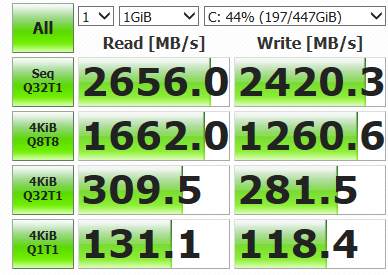eveminelove :
Greetings, I've installed Optane 905p 480GB as i primary Disk, installed Windows and other software, downloaded everything related to 905p from a Intel's site, patched mobo BIOS etc.
But crystal disk shows relative low results, eps on 4Kib Q32T1
Its actually lower than my old WD Black NVMe, i bought Optane as it was advertised superior on Random read/white. I also compared stats from other reviews of PRO 970, WD Black and other 905p modules
Maybe i need to enable something?
905p is U.2 and connected via m.2 adapter directly to the board.
Setup is:
Mobo Gigabyte z390 UD
CPU I5+8500
RAM 16Gb 2800
PSU 650W
Your situation is perfectly normal for not having write back cache enabled. Reads will only slightly improve with write back caching enabled but writes can increase quite dramatically. However keep in mind write back caching is a cheat when it comes to benchmarking as data is reported as written to media before it is actually written to the media. This is probably the reason the WD black SSD beat the Optane drive. If circumstances were matched the Optane drive would soundly beat it by a wide margin.
Also one possible additional reason may be the 960 pro has a buffer memory chip on it & the 905p does not. It writes directly to the storage media when writing. So the write speeds are not directly comparable. Since write speeds for nand flash is actually lower than for 3D Crosspoint what you are seeing on the write tests especially on the smaller file sizes is not the speed of the media but of the memory chip mostly on these write tests.
Write speeds for 3D Crosspoint memory is limited by the controllers not the media as Optane DIMMs latency is only 350 nanoseconds which is based on the same media but faster controller. This is compared to 11,000 nanoseconds write latency for Optane drives such as the 905p. This is due to the number & speed of the controllers & interfaces before it reaches the Optane storage media.
http://.
Unfortunately they don't list the write latency but I suspect it to be considerably better than Optane SSDs.
I have 3x32GB Optane memory in RAID 0 in my computer & except for sequential reads your 905p is still faster in every category with write back caching disabled. If I enable write back caching this my drive is faster than is shown for your 905p but only in low to high que with one thread 4K writes & reads except for 8 thread reads & writes faster on your 905p. But given that RAID does add latency & writes in general are slow on the Optane Memory products mine is still waxing the Samsung 960 pro in reads by a wide margin in my system which is considered on of the very fastest SSDs even without write back caching enabled in all read categories & in low que writes .
Optane without write back caching enabled always writes to directly to the media. Lower versions of Optane have no on board cache at all, This may also be true of the 905p. The media is fast enough in & of itself to not need a cache. Optane DIMMs based on the same technology have much lower latency than even the 905p. Difference is the type & number of controllers & interfaces standing in the way, not the media.
Note; You may need the intel rapid storage controller driver to enable write back caching. Also there is an Optane specific NVME driver for your drive on Intel's website.



